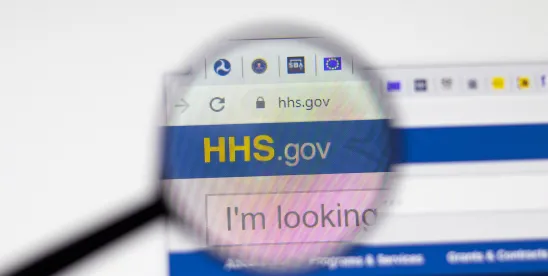Highlights
- The HHS-OIG released a favorable opinion regarding a customer loyalty program in which members earn redeemable points for future product purchases and tiered benefits by purchasing company products
- The “discount” safe harbor to the Anti-Kickback Statute (AKS) does not apply to the proposed arrangement’s loyalty program
- The proposed arrangement includes factors, the agency said, that limit risk under the AKS and the civil monetary penalty laws (CMP)
The U.S. Department of Health and Human Services’ Office of Inspector General (HHS-OIG) recently released Advisory Opinion No. 24-10, a favorable opinion regarding the federal Anti-Kickback Statute (AKS) and civil monetary penalty laws (CMP) against beneficiary inducements as applied to a customer loyalty program.
The program, which involves redeemable points and tiered benefits based on product purchases, was offered by a distributor that provides dental and laboratory supplies, equipment and technology, repair services and business support services to office-based dental practitioners.
The distributor operates a customer loyalty program in which members earn points on dental supply purchases, which can then be redeemed on future purchases. Redeeming points reduces the price of those future purchases. The membership is divided into tier levels. The tiers are designated based on members’ annual spending levels, and each tier provides additional offerings and promotions.
According to the opinion, the proposed arrangement expands the existing customer loyalty program beyond the company’s dental division. Members can earn points on purchases from the company’s dental division and some of its other subsidiaries. The subsidiaries offer specialty dental services and provide general business software and financial services. The members can earn points on items and services that are both reimbursable and non-reimbursable by federal health care programs. The proposal still includes the tiered membership levels, with benefits and discounts increasing with each tier level.
HHS-OIG’s Analysis
The HHS-OIG concluded both parts of the proposed arrangement implicated the AKS and that neither the points program nor the tier benefits are protected by the “discount” safe harbor to the AKS. However, because the proposed program has safeguards designed to mitigate the risk of fraud and abuse, the HHS-OIG would not impose sanctions against the distributor of dental supplies.
The HHS-OIG analyzed the redeemable points and tier benefits separately. The agency found the points implicated the AKS, but determined they created little risk of fraud and abuse because of the following factors:
- Each point awarded to members is of a low dollar value ($0.005). As a result, there is minimal risk of unfairly steering members to the company.
- The program includes features that prevent influencing members to purchase particular items or services. All qualifying purchases earn points in the same way, so there is no incentive for members to purchase any certain product.
- The program prevents members from using their points to cover more than 50 percent of the purchase price. This safeguard prevents against the provision of free items in exchange for purchases of federally reimbursable items.
- There are protections in place that ensure members use their points only for the purchase of redeemable products. Members cannot redeem points for cash, points have no value if they are not redeemed, and points are not transferable to other members or non-member customers.
With respect to the tiered benefits, the HHS-OIG similarly found that the benefits implicated the AKS, but that they posed little risk of fraud and abuse due to the following factors:
- The types of benefits offered limit the risk of unfair competition and improper steering of customers to the company. The benefits relate to the company’s customer service offerings, such as priority service and extended labor warranties, instead of unrelated rewards like concert and sport tickets.
- The benefits are structured so that they are unlikely to cause overutilization or corrupt medical decision making. When members spend more on company products, they earn more benefits, which are comprised of support services for those products.
- The benefits design limits the risk that certain members or types of purchases would be selectively rewarded. The tiered benefits are based on objective criteria set in advance and shared with members.
The HHS-OIG determined the proposed arrangement presented a low risk of fraud and abuse because of the safeguards that mitigate the risk of steering customers to the company and improperly influencing medical decision-making.
Key Takeaways
This advisory opinion, while highly fact-specific, highlights an example of a customer loyalty program that implicates the AKS and CMP, but does not warrant sanctions due to sufficient safeguards that mitigate risk of fraud and abuse. Suppliers, wholesalers, and distributors may wish to revisit their customer loyalty awards program to ensure compliance with the advisory opinion.





 />i
/>i
